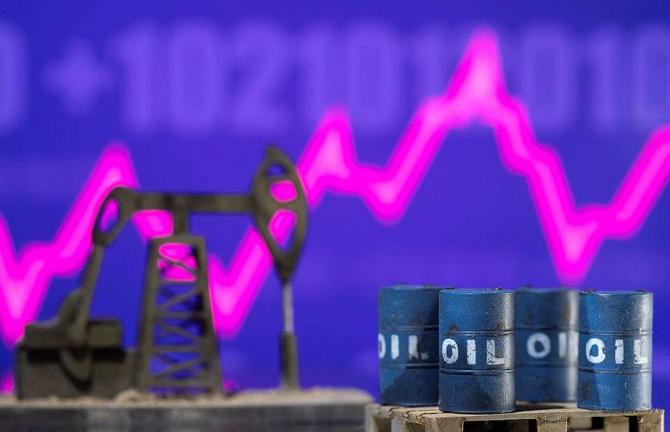Indian imports of Russian crude oil may stabilise or even decline in 2024 from record 2023 levels amid shrinking discounts, lower output, and a rebound in West Asian supplies, according to the ship-tracking data and industry executives.

This may impact the billions of dollars in annual savings that India made last year.
Imports of Russian oil jumped by a record 140 per cent in calendar 2023 to 1.79 million barrels a day (b/d) from 740,400 b/d in 2022, when Russia marched into Ukraine in February, and from just 102,000 b/d in 2021, according to the data from Paris-based market intelligence agency Kpler.
Last year, the surge in Russian imports, which accounted for 39 per cent of India’s crude oil imports from 16 per cent a year earlier, was accompanied by a decline in purchases from India’s traditional suppliers in West Asia.
Shipments from Iraq, Saudi Arabia, and the United Arab Emirates, the top three Gulf suppliers to India, fell by 17 per cent last year to 1.88 million b/d.
Russian Urals is now an important part of India’s crude oil purchases because refiners are proficient in processing Russian grades, said R Ramachandran, former refinery head, Bharat Petroleum, and now an oil industry consultant.
Discounts on Russian grades have declined by more than half to $4-5 per barrel from $11-13 in early 2023, two Mumbai-based executives in the refining sector said.
It is unlikely that Russian traders will offer record double-digit discounts this year because of higher demand for Russian export benchmark Urals grade, and amid lower production by Moscow, at least until the end of the first quarter of this year, an industry executive said.
A Mumbai-based refining executive responsible for Russian purchases said he did not expect discounts to expand, anticipating imports to average between 1.5 and 1.7 million b/d this year.
The stricter enforcement of sanctions by the US in the past few months, resulting in more than 10 Russian tankers carrying crude oil to China and India being charged with violating rules, has led to an increase in freight rates by as much as 20 per cent.
These factors might cut India’s savings on Russian oil imports, which averaged close to $4.5 billion, based on calculations from the ship-tracking and industry data.
These savings may fall by a third — assuming an average of $5 per barrel (bbl) discount on imports of 1.6 million b/d in 2024, leading to savings of over $3 billion for Indian refiners.
It is still a tidy sum, considering that oil firms are coping with volatility in global crude oil rates and a freeze in pump prices of diesel and petrol since May 2022.
Imports of Russian crude oil in December averaged 1.44 million b/d, a fall of 14 per cent from November and from a record 2.16 million b/d in May, the Kpler data shows.
Russian oil accounted for around 33 per cent of India’s overall crude oil imports in December, six percentage points lower than the 2023 average.
The stricter policing of tankers carrying Russian oil amid reduction in output contributed to falling purchases, industry officials said.
There were issues with payment. Indian Oil imported only 258,000 b/d of Russian oil in December, declining by nearly half in the month.
Bharat Petroleum was the biggest purchaser of Russian crude oil recently at 314,000 b/d, up by 60,000 b/d on the month, followed by Reliance Industries at 285,000 b/d, according to Kpler.
Washington has sent notices to some 30 owners and managers of oil tankers to check on their compliance with the price cap and warned the shipping industry against any violation, US market publication Energy Intelligence reported.
Deputy Prime Minister Alexander Novak has said Russia’s oil exports in 2024 will be lower than initially planned because of commitments under Organization of the Petroleum Exporting Countries-plus agreements, Energy Intelligence reported. Russia agreed to cut crude oil exports by 500,000 b/d in August and 300,000 b/d in September-December, and agreed to extend the commitment — 300,000 b/d for crude oil and 200,000 b/d for oil products — to the end of the first quarter of 2024.











